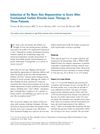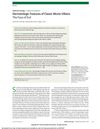Search
for
Sort by
Research
240-270 / 378 results
research Orchestration of Mesenchymal Stem/Stromal Cells and Inflammation During Wound Healing
Mesenchymal Stem/Stromal Cells (MSCs) help in wound healing and tissue regeneration, but can also contribute to tumor growth. They show promise in treating chronic wounds and certain burns, but their full healing mechanisms and potential challenges need further exploration.

research Evaluation of RU58841 as an Anti-Androgen in Prostate PC3 Cells and a Topical Anti-Alopecia Agent in the Bald Scalp of Stumptailed Macaques
RU58841, a nonsteroidal anti-androgen, showed potential as a topical treatment for hair loss, increasing hair density, thickness, and length without systemic side effects in Stumptailed Macaques.

research Techniques for the Discovery and Evaluation of Drugs Against Alopecia
We need better treatments for hair loss, and while test-tube methods are helpful, they can't fully replace animal tests for evaluating new hair growth treatments.
research Disturbance of the Circadian System in Shift Work and Its Health Impact
Shift work disrupts the body's natural clock, leading to health problems.
research Comparison of Alopecia Areata in Human and Nonhuman Mammalian Species
The document concludes that certain rats and mice are useful for studying hair loss in humans and testing treatments.
research Hair: Microscopic Analysis
Microscopic hair analysis helps identify species and sometimes individuals in forensic science.

research Hair Keratin Associated Proteins: Characterization of a Second High Sulfur KAP Gene Domain on Human Chromosome 21 in Fond Memory of Dr. Peter Steinert
A second domain of high sulfur KAP genes on chromosome 21q23 is crucial for hair structure.

research Lack of Response to Laser Comb in Spontaneous and Graft-Induced Alopecia Areata in C3H/HeJ Mice
The laser comb did not improve hair regrowth in mice with alopecia areata.

research Animal Models of Androgen-Dependent Disorders of the Pilosebaceous Apparatus
Testosterone causes hair loss in AGA mice, which are good for testing baldness treatments, and both minoxidil and cyproterone acetate can prevent this hair loss.

research Induction of De Novo Hair Regeneration in Scars After Fractionated Carbon Dioxide Laser Therapy in Three Patients
Laser therapy helped new hair grow in scarred skin for three patients.

research Alopecia Areata in a Dog: Clinical, Dermoscopic, and Histological Features
The dog with an Alopecia Areata-like condition showed signs of an autoimmune disease and partially regrew hair without treatment, suggesting dogs could be models for human AA research.

research Corticosteroids for the Treatment of Duchenne Muscular Dystrophy
Corticosteroids, especially prednisone, improve short-term muscle strength in Duchenne muscular dystrophy but have manageable side effects.

research Microenvironmental Reprogramming by Three-Dimensional Culture Enables Dermal Papilla Cells to Induce De Novo Human Hair-Follicle Growth
Growing human skin cells in a 3D environment can stimulate new hair growth.

research Melatonin: A Cutaneous Perspective on Its Production, Metabolism, and Functions
Melatonin may benefit skin health and could be a promising treatment in dermatology.

research Congenital Adrenal Hyperplasia: Current Insights in Pathophysiology, Diagnostics, and Management
Early diagnosis and individualized treatment improve outcomes for Congenital Adrenal Hyperplasia.

research Do Men's Faces Really Signal Heritable Immunocompetence?
Masculine facial features may not reliably indicate heritable health, and more research is needed.

research Targeting the Janus Kinase Family in Autoimmune Skin Diseases
Janus kinase inhibitors are promising treatments for autoimmune skin diseases like eczema and psoriasis.

research Learning From Nudity: Lessons From The Nude Phenotype
The Foxn1 gene mutation causes hairlessness and immune system issues, and understanding it could lead to hair growth disorder treatments.

research Alopecia Areata: Animal Models Illuminate Autoimmune Pathogenesis and Novel Immunotherapeutic Strategies
Animal models have helped understand hair loss from alopecia areata and find new treatments.

research Effects of the Lexington LaserComb on Hair Regrowth in the C3H/HeJ Mouse Model of Alopecia Areata
The Lexington LaserComb helped regrow hair in mice with a condition similar to human hair loss.

research Specific Receptor Detection by a Functional Keratinocyte Growth Factor-Immunoglobulin Chimera
A new protein was made to detect specific skin cell growth receptors and worked in normal skin but not in skin cancer cells.

research The Role of Lymphocytes in the Development and Treatment of Alopecia Areata
Lymphocytes, especially CD8+ T cells, play a key role in causing alopecia areata, and targeting them may lead to new treatments.

research Alopecia Areata: Clinical Review and Treatment Approaches
Alopecia Areata has no guaranteed treatment for hair regrowth, but options like corticosteroids and minoxidil are used, with future research focusing on genetic and immune therapies.

research Dermatologic Features of Classic Movie Villains
Most classic movie villains have skin conditions, unlike the heroes, which may cause bias against real people with similar conditions.

research Associations Between Transition-Specific Stress Experience, Nocturnal Decline in Ambulatory Blood Pressure, and C-Reactive Protein Levels Among Transgender Men
Stress from being transgender is linked to higher blood pressure at night and more inflammation, which may affect heart health.

research Detection of Hair MicroRNAs as Novel Potent Biomarkers: Evaluation of Usefulness for Scleroderma Diagnosis
Hair microRNAs could be effective biomarkers for diagnosing scleroderma.

research Behavioral Dermatology
Behavioral dermatology treats skin problems by considering both emotional and physical factors.

research The Prolactin Receptor as a Therapeutic Target in Human Diseases: Exploring New Potential Indications
Blocking the prolactin receptor might help treat various diseases, but more research is needed.

research How to Speak Postmodern: Medicine, Illness, and Cultural Change
The document suggests medicine should integrate biological and cultural factors and focus on holistic, equitable care.